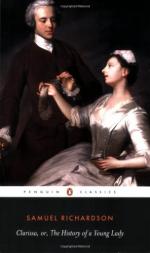The whole story of the other is a pack of d——d stuff. Lothario, ’tis true, seems such another wicked ungenerous varlet as thou knowest who: the author knew how to draw a rake; but not to paint a penitent. Calista is a desiring luscious wench, and her penitence is nothing else but rage, insolence, and scorn. Her passions are all storm and tumult; nothing of the finer passions of the sex, which, if naturally drawn, will distinguish themselves from the masculine passions, by a softness that will even shine through rage and despair. Her character is made up of deceit and disguise. She has no virtue; is all pride; and her devil is as much within her, as without her.
How then can the fall of such a one create a proper distress, when all the circumstances of it are considered? For does she not brazen out her crime, even after detection? Knowing her own guilt, she calls for Altamont’s vengeance on his best friend, as if he had traduced her; yields to marry Altamont, though criminal with another; and actually beds that whining puppy, when she had given up herself, body and soul, to Lothario; who, nevertheless, refused to marry her.
Her penitence, when begun, she justly styles the phrensy of her soul; and, as I said, after having, as long as she could, most audaciously brazened out her crime, and done all the mischief she could do, (occasioning the death of Lothario, of her father, and others,) she stabs herself.
And can this be the act of penitence?
But, indeed, our poets hardly know how to create a distress without horror, murder, and suicide; and must shock your soul, to bring tears from your eyes.
Altamont indeed, who is an amorous blockhead, a credulous cuckold, and, (though painted as a brave fellow, and a soldier,) a mere Tom. Essence, and a quarreler with his best friend, dies like a fool, (as we are led to suppose at the conclusion of the play,) without either sword or pop-gun, of mere grief and nonsense for one of the vilest of her sex: but the Fair Penitent, as she is called, perishes by her own hand; and, having no title by her past crimes to laudable pity, forfeits all claim to true penitence, and, in all probability, to future mercy.
But here is Miss Clarissa Harlowe, a virtuous, noble, wise, and pious young lady; who being ill used by her friends, and unhappily ensnared by a vile libertine, whom she believes to be a man of honour, is in a manner forced to throw herself upon his protection. And he, in order to obtain her confidence, never scruples the deepest and most solemn protestations of honour.
After a series of plots and contrivances, al baffled by her virtue and vigilance, he basely has recourse to the vilest of arts, and, to rob her of her honour, is forced first to rob her of her senses.
Unable to bring her, notwithstanding, to his ungenerous views of cohabitation, she over-awes him in the very entrance of a fresh act of premeditated guilt, in presence of the most abandoned of women assembled to assist his devilish purpose; triumphs over them all, by virtue only of her innocence; and escapes from the vile hands he had put her into.




